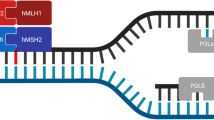Abstract
The authors analyzed a family in which three descendants presented with adenocarcinoma of the colon. In two of them the presence of colonic adenomatosis was observed. Another family member, a 13-year-old girl, presented with Turcot syndrome, that is, brain tumor associated with colonic adenomatosis. The nature of the hereditary transmission of Turcot syndrome is hence analyzed, discussing whether it happens through an autosomal recessive or a dominant gene. Undoubtedly the family has colonic adenomatosis, a disease considered of autosomal dominant transmission. Based on the clinical observation, the authors suggest that Turcot syndrome may be determined by an autosomal gene with a pleiotropic effect and variable expressivity.
Similar content being viewed by others
References
Turcot J, Després J-P, St. Pierre F. Malignant tumors of the central nervous system associated with familial polyposis of the colon: report of two cases. Dis Colon Rectum 1959;2:465–8.
McKusick VA, Osler W, eds. Autosomal recessive phenotypes. In: Mendelian inheritance in man: catalogs of autosomal dominant, autosomal recessive and X-linked phenotypes. Baltimore: Johns Hopkins University Press, 1983:571–979.
Itoh H, Ohsato K, Yao T, Iida M, Watanabe H. Turcot's syndrome and its mode of inheritance. Gut 1979;20:414–9.
Cohen SB. Familial polyposis coli and its extracolonic manifestations. J Med Genet 1982;19:193–203.
McKusick VA. Genetic factors in intestinal polyposis. JAMA 1962;182:271–7.
Parks TG, Bussey HJ, Lockhart-Mummery HE. Familial polyposis coli associated with extracolonic abnormalities. Gut 1970; 11:323–9.
Baughman FA Jr, List CF, Williams JR, Muldoon JP, Segarra JM, Volkel JS. The glioma-polyposis syndrome. N Engl J Med 1969;281:1345–6.
Itoh H, Ohsato K. Turcot syndrome and its characteristic colonic manifestations. Dis Colon Rectum 1985;28:399–402.
Smith WG, Kern BB. The nature of the mutation in familial multiple polyposis: papillary carcinoma of the thyroid, brain tumors and familial multiple polyposis. Dis Colon Rectum 1973;16:264–71.
Jagelman DG. Familial polyposis coli. Surg Clin North Am 1983;63:117–28.
Sayed AK, Jafri SZ, Shenoy SS. Intestinal polyposis and brain tumor in a family. Dis Colon Rectum 1979;22:486–91.
Author information
Authors and Affiliations
About this article
Cite this article
Costa, O.L., Silva, D.M., Colnago, F.A. et al. Turcot syndrome. Dis Colon Rectum 30, 391–394 (1987). https://doi.org/10.1007/BF02555461
Received:
Issue Date:
DOI: https://doi.org/10.1007/BF02555461




